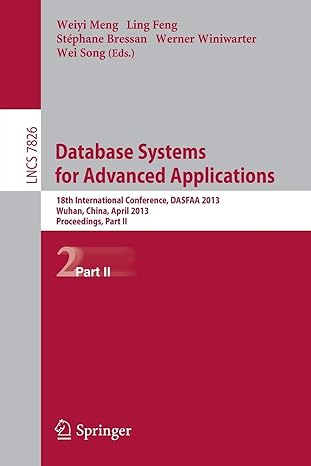Question
/*Change the public add() method in the class so that the new node is inserted at the end of the linked chain.*/ /*Please explain how
/*Change the public add() method in the class so that the new node is inserted at the end of the linked chain.*/
/*Please explain how it works, thank you.*/
//Bag.h
#ifndef LINKED_BAG_ #define LINKED_BAG_
#include "BagInterface.h"
template class LinkedBag : public BagInterface { private: Node* headPtr; // Pointer to first node int itemCount; // Current count of bag items // Returns either a pointer to the node containing a given entry // or the null pointer if the entry is not in the bag. Node* getPointerTo(const ItemType& target) const; public: LinkedBag(); LinkedBag(const LinkedBag& aBag); // Copy constructor virtual ~LinkedBag(); // Destructor should be virtual int getCurrentSize() const; bool isEmpty() const; bool add(const ItemType& newEntry); bool remove(const ItemType& anEntry); void clear(); bool contains(const ItemType& anEntry) const; int getFrequencyOf(const ItemType& anEntry) const; std::vector toVector() const; }; // end LinkedBag
#include "LinkedBag.cpp" #endif
//Bag.cpp
#include "LinkedBag.h" #include "Node.h" #include
template LinkedBag::LinkedBag() : headPtr(nullptr), itemCount(0) { } // end default constructor
template LinkedBag::LinkedBag(const LinkedBag& aBag) { itemCount = aBag.itemCount; Node* origChainPtr = aBag.headPtr; // Points to nodes in original chain if (origChainPtr == nullptr) headPtr = nullptr; // Original bag is empty else { // Copy first node headPtr = new Node(); headPtr->setItem(origChainPtr->getItem()); // Copy remaining nodes Node* newChainPtr = headPtr; // Points to last node in new chain origChainPtr = origChainPtr->getNext(); // Advance original-chain pointer while (origChainPtr != nullptr) { // Get next item from original chain ItemType nextItem = origChainPtr->getItem(); // Create a new node containing the next item Node* newNodePtr = new Node(nextItem); // Link new node to end of new chain newChainPtr->setNext(newNodePtr); // Advance pointer to new last node newChainPtr = newChainPtr->getNext();
// Advance original-chain pointer origChainPtr = origChainPtr->getNext(); } // end while newChainPtr->setNext(nullptr); // Flag end of chain } // end if } // end copy constructor
template LinkedBag::~LinkedBag() { clear(); } // end destructor
template bool LinkedBag::isEmpty() const { return itemCount == 0; } // end isEmpty
template int LinkedBag::getCurrentSize() const { return itemCount; } // end getCurrentSize
template bool LinkedBag::add(const ItemType& newEntry) { // Add to beginning of chain: new node references rest of chain; // (headPtr is null if chain is empty) Node* nextNodePtr = new Node(); nextNodePtr->setItem(newEntry); nextNodePtr->setNext(headPtr); // New node points to chain
headPtr = nextNodePtr; // New node is now first node itemCount++; return true; } // end add
template std::vector LinkedBag::toVector() const { std::vector bagContents; Node* curPtr = headPtr; int counter = 0; while ((curPtr != nullptr) && (counter < itemCount)) { bagContents.push_back(curPtr->getItem()); curPtr = curPtr->getNext(); counter++; } // end while return bagContents; } // end toVector
template bool LinkedBag::remove(const ItemType& anEntry) { Node* entryNodePtr = getPointerTo(anEntry); bool canRemoveItem = !isEmpty() && (entryNodePtr != nullptr); if (canRemoveItem) { // Copy data from first node to located node entryNodePtr->setItem(headPtr->getItem()); // Delete first node Node* nodeToDeletePtr = headPtr; headPtr = headPtr->getNext(); // Return node to the system nodeToDeletePtr->setNext(nullptr); delete nodeToDeletePtr; nodeToDeletePtr = nullptr; itemCount--; } // end if return canRemoveItem; } // end remove
template void LinkedBag::clear() { Node* nodeToDeletePtr = headPtr; while (headPtr != nullptr) { headPtr = headPtr->getNext();
// Return node to the system nodeToDeletePtr->setNext(nullptr); delete nodeToDeletePtr; nodeToDeletePtr = headPtr; } // end while // headPtr is nullptr; nodeToDeletePtr is nullptr itemCount = 0; } // end clear
template int LinkedBag::getFrequencyOf(const ItemType& anEntry) const { int frequency = 0; int counter = 0; Node* curPtr = headPtr; while ((curPtr != nullptr) && (counter < itemCount)) { if (anEntry == curPtr->getItem()) { frequency++; } // end if counter++; curPtr = curPtr->getNext(); } // end while return frequency; } // end getFrequencyOf
template bool LinkedBag::contains(const ItemType& anEntry) const { return (getPointerTo(anEntry) != nullptr); } // end contains
template Node* LinkedBag::getPointerTo(const ItemType& anEntry) const { bool found = false; Node* curPtr = headPtr; while (!found && (curPtr != nullptr)) { if (anEntry == curPtr->getItem()) found = true; else curPtr = curPtr->getNext(); } // end while return curPtr; }
//node.h
#ifndef NODE_ #define NODE_
template
#include "Node.cpp" #endif
//baginterface.h
#ifndef BAG_INTERFACE_ #define BAG_INTERFACE_
#include
template
virtual int getCurrentSize() const = 0;
virtual bool isEmpty() const = 0;
virtual bool add(const ItemType& newEntry) = 0;
virtual bool remove(const ItemType& anEntry) = 0;
virtual void clear() = 0;
virtual int getFrequencyOf(const ItemType& anEntry) const = 0;
virtual bool contains(const ItemType& anEntry) const = 0; virtual std::vector
virtual ~BagInterface () { } }; // end BagInterface #endif
Step by Step Solution
There are 3 Steps involved in it
Step: 1

Get Instant Access to Expert-Tailored Solutions
See step-by-step solutions with expert insights and AI powered tools for academic success
Step: 2

Step: 3

Ace Your Homework with AI
Get the answers you need in no time with our AI-driven, step-by-step assistance
Get Started


